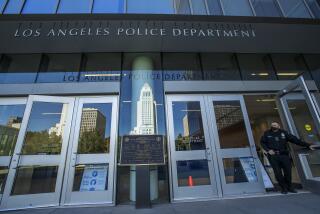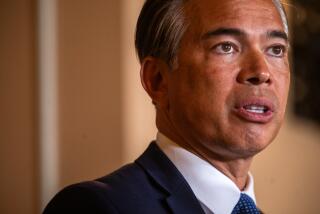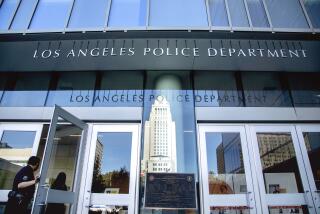Independent Probes of Police Brutality Needed, Panel Told
Having the district attorney’s office investigate allegations of police misconduct is “like having the foxes guard the hen house,” a Los Angeles attorney told a congressional forum on police brutality Monday.
“There is too close a relationship between the district attorney’s office and line officers to inspire the confidence we need” in that office’s investigations, said attorney Carl Douglas, who has represented clients suing police departments in cases of alleged brutality.
Douglas was among more than a dozen witnesses, including Los Angeles Police Chief Bernard Parks, Sheriff Lee Baca, Dist. Atty. Gil Garcetti and relatives of people killed by officers or deputies, who testified before members of the Congressional Black Caucus.
An emotional and often angry crowd of more than 150 people, who frequently booed and shouted catcalls at Parks and Baca turned out for the daylong forum at the Old State Office Building downtown.
No police officers or deputies have been prosecuted in Los Angeles County for killing a civilian in the last four years, Douglas said.
Even after a Superior Court jury awarded a $65-million judgment--later reduced to $24 million--against the Sheriff’s Department after finding that deputies beat guests at a Cerritos wedding shower, there were no prosecutions, Douglas said.
“That speaks volumes on the need for a special prosecutor,” he said.
The U.S. Civil Rights Commission recommended such an independent prosecutor for Los Angeles earlier this year.
In addition to raising questions about an independent prosecutor, panel members also questioned Garcetti’s decision to rely on Police and Sheriff’s Department investigations of police shootings, rather than conduct his own.
Garcetti said budget reductions forced his office to drop those independent investigations. He was faced with the dilemma of whether to stop prosecuting certain cases or stop independently investigating police shootings, Garcetti said.
“You clearly have an appearance of conflict in carrying out your responsibilities,” Rep. Julian Dixon (D-Los Angeles) told Garcetti.
Parks and Baca, Dixon said, are the gatekeepers of the facts. “It is inappropriate for the organization being accused of misconduct to be the gatekeepers of facts.”
Garcetti noted that the California attorney general and the U.S. attorney’s office are independent agencies, and both could overrule his decision not to prosecute.
He recalled that during budget discussions when his office sought additional funds, Los Angeles County Supervisor Yvonne Brathwaite Burke had asked him what library would he like to see closed or what other service should be curtailed.
Burke, however, sitting at the table with Garcetti, said she thought an independent prosecutor would be “a good idea.” Multimillion-dollar judgments against the Sheriff’s Department are too expensive to taxpayers, she said, and the $24 million awarded in the Cerritos beatings could have built a library.
It is absurd for Garcetti to say he cannot independently look at allegations of police brutality because of budget cuts, Rep. Juanita Millender-McDonald (D-Carson) said outside the hearing room.
“When a human life has been taken, there should be no mention of budgetary constraints. I’m appalled at the number of [police] killings.”
Constance Flaum, whose son Michael William Arnold was shot 106 times by law enforcement officers in Hawthorne last year, called the congressional panel heroes.
“It is so significant that this Black Caucus is concerned for all of the people regardless of race,” said Flaum, who is white.
Rep. Maxine Waters (D-Los Angeles) told Baca that his department has a history that is difficult to overcome, with documented cases of rogue deputies wearing tattoos and other deputies stealing money from drug raids.
“We have to pay special attention to those who have a gun and a badge,” she said. “One of the Constitution’s intentions is that we never, ever have a police state.”
Baca acknowledged that deputies who wear the tattoos that Waters mentioned “have weakened our credibility. They give the impression that they are the rogue people. I have difficulty explaining why people who have a gun and wear a badge would wear [those tattoos].”
Panel members emphasized that the Black Caucus supports what they called the vast majority of professional law enforcement officers who carry out their duties lawfully.
But they pointed out that police brutality has a long history in this country, and that efforts to hold abusive officers accountable is gaining momentum.
“We want to make sure that the police community knows that this is something we are very serious about,” Waters said outside the hearing room.
The caucus had held earlier forums in New York, Chicago and Washington, and Waters said the group will issue a report in about three weeks at the Congressional Black Caucus Foundation’s annual legislative conference.
That report, committee members said, will include specific recommendations to U.S. Atty. Gen. Janet Reno on changes that should be made in how allegations of police brutality are investigated.
More to Read
Sign up for Essential California
The most important California stories and recommendations in your inbox every morning.
You may occasionally receive promotional content from the Los Angeles Times.










